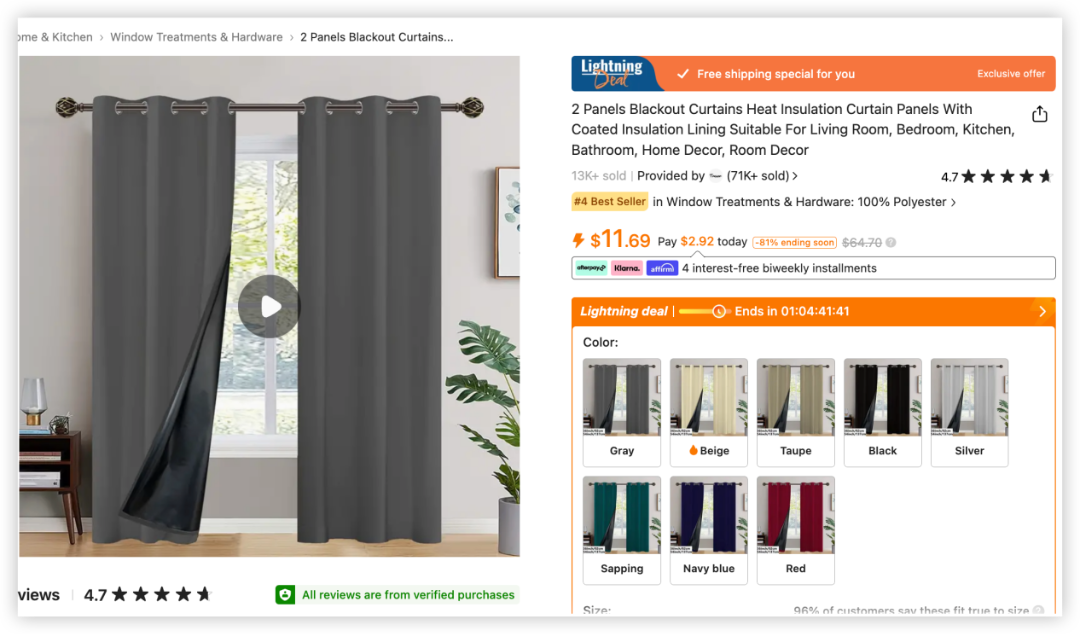This article is reproduced from: the forefront of entrepreneurship
Author: Feng Yu
In June, it was the summer carnival promotion season of cross-border e-commerce.
"At present, we have launched 10 stores on the mainstream cross-border e-commerce platform, with monthly sales of 5000 and 6000, and GMV can reach about 200000 yuan." Home textile cross-border seller West (alias) I am quite satisfied with this achievement. After all, they began to transform cross-border e-commerce at the beginning of this year.
The West's textile factory is located in the Jiangsu and Zhejiang regions where cross-border business is active. Its main businesses are curtains, table flags, tablecloths, etc. In the past two decades, this traditional business has enjoyed nearly 90% of the profits from domestic sales alone.

Picture/West's curtain products
The days of lying and earning money soon passed, and this textile factory with an annual production capacity of more than 10 million also turned its attention to the global market this year.
Cross border e-commerce is more than hot? The cross-border platforms led by them claim to have "taken away the business of Amazon, the global e-commerce giant". Every year, tens of millions of packages are airlifted from China's coastal industrial belt to the other side of the Pacific Ocean. Small language graduates are snapped up. On the cross-border platform, they have a new job opportunity.
No one can change the direction of the tide except to join it.
While the domestic e-commerce platform is still telling old stories, businesses like West have begun to draw a new cross-border e-commerce map.
01: Find out the flow password of cross-border e-commerce
The West family has been engaged in curtain business since their parents' generation. In the 1990s, it was a small street shop and later developed into a small processing workshop. Thanks to the rapid development of China's real estate industry over the past two decades, West's factories have also become larger and larger.
After the epidemic, the pure domestic trade business became difficult to do, and the factory began to lose money on a small scale. As the second generation of atypical home textiles, West, who was originally engaged in the education and training industry, also began to take over the family business, trying to sell some goods overseas through cross-border platforms.
Before that, the curtain business of the West family had never been contaminated by e-commerce business.
The shift of factory business focus is often not only about the operation itself. The shift of talents, capital and industry leading businesses means that more resources will soon flow into new countries and regions.
West can clearly feel that the whole cross-border e-commerce track is becoming crowded 」 disclose.
From the beginning of the year to the present, there are 2000-3000 orders from West stores in Temu every month, hundreds of orders from Fast Retailing, and 1000-2000 orders from Shein. The total monthly sales are more than 5000.

Figure/West's monthly sales of black film curtains in Temu store are 5000
Compared with domestic curtain products, the price of foreign trade goods is lower, and the cost is almost one-fifth to one-third of the cost of domestic trade goods. "At present, the per customer price is basically in the range of $5-50," West said.
The profit rate of the standard curtain products directly linked in the store can reach 30% - 50%, while the profit rate of the customized products is higher, and the price is usually 8-10 times of the cost. "The customer price of customized products can reach 2000 yuan."
The so-called customization means that overseas customers re select the fabric and size of curtains. If the standard product is 1.32m * 1.83m, if the customer wants to increase the width to 1.6m and the height to 2.5m, it needs to be customized according to the new size, which often requires paying a higher price.
"The number of customized orders is small, but since June, there have been almost 1-2 orders every day, and they will be completed soon," West said.
There is no absolute off peak season for curtain products, and the number of cross-border business orders depends more on the platform.
Compared with domestic e-commerce 618, Double 11 and other major promotion nodes, strictly speaking, the first half of the cross-border e-commerce season is only March, which is a peak sales season, and the platform will focus on streaming. June is a small peak, July and August enter the trough, September begins to accumulate energy, and November again reaches the peak.
"June is the sales port of the overseas market throughout the summer. All cross-border e-commerce platforms will generally enter the state of large-scale streaming from the middle of June, and the sales of merchants will also improve significantly." West soon found out the law of cross-border e-commerce flow fluctuations.
In e-commerce circle, mastering the operation law of traffic is almost equivalent to grasping the wealth password.
02: How to catch the "Splendid Wealth"?
Whether it is domestic e-commerce or cross-border business, the logic of "flow first" has always held countless e-commerce people hostage - they will be killed by their peers if they do not involve themselves.
Cross border e-commerce platforms are also constantly launching new traffic enrichment myths.
In February 2023, Temu splashed 14 million dollars in the US Super Bowl to buy two advertising slots and put a 30 second advertisement.
According to Data ai, Temu had about 5 million DAUs at the beginning of February, and about 16 million MAUs in January. The retention rate on the 7th day increased from 14% in November 2022 to 22% in January 2023.
The rise and fall of peers also led sellers to rely heavily on platform activities.
"Last year, Temu exploded its orders in the United States by launching the" Super Bowl ", and the daily life data soared, and platform sellers could always get a piece of the cake." West said that if only relying on daily traffic, without the platform's recommendation, the transformation would be relatively limited.
The cross-border e-commerce platform also needs to attract more traffic from external stations at the same time, compared with the seller's own investment in the station.
"Since the end of May, AliExpress has concentrated on overseas large-scale investment to attract users. As merchants receive more traffic, sales will naturally rise," he added.
How to grasp the flow explosion point of the platform becomes a subject.
"The core is to give users greater discounts than usual, such as the lowest price in 90 days, or give 10% - 20% discount on the lowest price." For the traffic of the platform "Splash", West is well aware of the tricks to attract users to place orders and retain them.
If you want to undertake the traffic of the promotion node well, you not only need to understand the preferential activities of the platform, such as cross store full sales, related discounts, etc., but also the most important thing is the timing. The activities in June should be planned from March at the earliest. "If your expected profit is 50%, you need to raise the profit rate to 80% three months in advance, so that the profit will remain at a relatively high level after 90 days of low prices."
It is necessary to plan in advance, and cross-border e-commerce is no exception. If the seller did not take the lead in the layout and waited for the key nodes to set the preferential price, but found that the store would lose money, then the platform's "outrageous wealth" would only be wasted.
In addition to traffic, another key element is product ranking.
Take AliExpress as an example. When searching for product keywords on the platform, except for paid ads on the home page, the products rank high, and the traffic conversion must not be low.
"If a product can reach the Top 50 or even the Top 20 in the same category ranking, its sales will be difficult to decline," West said. "The product ranking is the result of comprehensive measurement, and it needs to examine the click rate, conversion rate, after-sales rate and praise rate."
The natural flow of West's stores in AliExpress is 500-800 visitors in April and May, and the number of visitors can reach 800-1000 after opening in June. The daily investment cost is about 60 yuan, and the average ROI is 1.5-3.
"The purpose of investment is to spend money to rank as high as possible, so that even if it is a loss, my products can also be on the search home page after the investment is stopped, and all the losses in the previous period can be earned back." West concluded.
For a product, the new product period, incubation period, growth period and maturity period constitute many details of running a store.
For sellers like West, S level promotions like 618 and Double 11 will be involved even if they lose money. "The promotion node will bring a large number of customers and transformation, and can improve the data of the entire store exponentially, so that the store can make money after the promotion."
At present, the cross-border e-commerce track is already in high winds and high waves. "If you can make money on any product last year, by 2024, such a good day will be gone forever," West sighed.
03: Cross border e-commerce Xiaobai, return, return, return
The game of traffic not only involved sellers, but also gradually let go of cross-border e-commerce in the name of Internet growth.
In the early years, the threshold for cross-border e-commerce operation was high, and most domestic sellers were deeply engaged in domestic trade or traditional foreign trade, taking to B orders, which almost ignored the cross-border platform business of to C.
In September 2022, Temu first proposed the concept of "full trusteeship", and other cross-border e-commerce platforms quickly followed. In December 2022, AliExpress announced to provide full custody services; In March 2023, Shopee, which focuses on the Southeast Asian market, announced the launch of full trusteeship; In May, TikTok Shop also launched a full hosting service.
Full trusteeship means that the platform is responsible for commodity pricing, marketing, customer acquisition, and contract performance, and merchants as suppliers only need to stock up to the warehouse. Due to the low entry threshold and large platform traffic, early full trusteeship is also considered as the standard template for the entire cross-border e-commerce industry.
But soon, under the full trusteeship mode, sellers generally lacked the pricing power of products and had the disadvantage of working for the platform. The semi trusteeship mode, which returned some autonomy to sellers, came into being.
In August 2023, AliExpress was the first in the industry to launch a half pipe and conduct trial operation. By January 2024, after four months of trial operation, AliExpress will officially launch semi hosting services. In March this year, Temu also launched semi hosting in the US station. Then at the beginning of May, Shein also officially launched the semi hosting mode.
Under the semi custody mode, the goods are not delivered directly by air from the domestic warehouse, but delivered by the seller to the overseas warehouse in advance. After the buyer places an order, the goods are delivered directly from the local warehouse to the user. The logistics is more efficient, and can be delivered in 3-4 days at the earliest.
This mode also means that the platform can sell more categories. "If the goods are stored in overseas warehouses, traditional logistics and shipping have less restrictions on the types of transportation, while air logistics and small piece logistics directly from domestic warehouses have more restrictions on the types of transportation," West revealed.
However, transporting goods to overseas warehouses first also means that logistics cost accounting will become extremely difficult.
Taking domestic logistics as an example, the cost of a piece of goods is 10 yuan, the freight from Hangzhou to Guangdong is 1 yuan, and the total cost is 11 yuan. If the seller wants to earn 5 yuan, he can price the goods at 16 yuan, and the platform can be put on the shelves after price verification.
Cross border logistics is usually divided into three sections: platform domestic warehouse, cross-border trunk logistics, and overseas local distribution, which also makes logistics costs less controllable.
"It is the first cost to send goods from home to overseas, and the last cost to send goods to overseas warehouses by delivery personnel. In addition, renting overseas warehouses is another cost. If you want to return the goods, you will face the dilemma of whether to continue to place them in the overseas warehouse or destroy them. If it is the former, it needs to be repackaged and put on the shelf. The whole calculation logic is very complex. " West to "Interface News, the Frontline of Entrepreneurship" 」 say.
When the low price is no longer the only killer for sellers, the supply chain competition is upgraded, and cross-border e-commerce enters the deepwater area.
"At present, less than 5% of the sellers who are really semi custodians have made money doing overseas positions." West said that semi custodians look simple, but blindly breaking into them may end up in a mess.
In his opinion, the cross-border e-commerce platform will only leave two types of sellers, one is the source factory, which is of high quality and low price; The other is the traders with strong supply chain capabilities, who are deeply bound with the industry belt merchants, and can keep the price to the lowest.
"In the past ten years, those cross-border sellers who have no supply of goods and only one package have made money, but their living space will be further squeezed in the future." West said that the shuffle of cross-border e-commerce has just begun.
(Cover source: Tu Chong's creativity)
(Source: friends of Hugo. com)




















